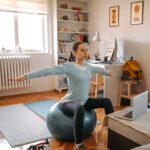
Physical activity and revision: why moving helps you remember better
Physical activity and revision: why moving helps you remember better
Sport and revision
Add active breaks into your revision sessions to boost memory, improve focus and reduce stress. Get practical tips on combining physical activity with effective revision.
You’ve probably heard that you should take breaks while revising, but did you know that moving a bit every day can actually help you remember better? You don’t need to be a top athlete – even a quick walk, some stretches, or a dance around your room can help your brain work better while you revise.
Physical activity improves memory, boosts focus and reduces stress. According to Dr John Ratey, professor at Harvard, “movement activates neurotransmitters that boost attention, learning and motivation.” Research published in Frontiers in Psychology also shows that exercise stimulates the hippocampus, the part of your brain that manages memory, which helps you retain information more quickly.
By moving a little before or during your revision sessions, you improve oxygen flow to your brain, reduce stress and increase concentration. So even if you’re not a fan of sport, adding a bit of movement to your day can transform your revision and make memorising much easier.
Why activity helps your brain remember better during revision
Ever noticed how hard it is to concentrate after hours stuck at your desk? Your brain isn’t a machine – it needs oxygen, movement and breaks to work at its best while you’re revising.
• Moving boosts oxygen to your brain:
When you walk, stretch or dance, your blood flows more effectively and carries extra oxygen to your brain. The result? Your neurons work better, helping you understand and remember faster. Even ten minutes of activity can give your brain a boost.
• Less stress, more memory space:
Stress often blocks memory, especially before an exam. Exercise helps release endorphins – the “feel-good” hormones – which lift your mood and reduce stress. Dr Ratey describes regular movement as “fertiliser for the brain,” creating the right conditions for learning without feeling overwhelmed.
• Better focus:
Exercise also sharpens your attention. Your brain “wakes up,” making it easier to stay focused when you get back to your notes. Research in Frontiers in Psychology has shown that moving before a study session helps you stay concentrated for longer.
In short, moving a little each day isn’t a waste of revision time – it’s an investment that helps you learn faster and revise with less stress. No need for intense workouts – just a bit of movement makes all the difference on exam day.
How to fit activity into your revision without wasting time
You don’t need to be sporty to feel the benefits of exercise during revision. Short bursts of activity are enough to boost memory, focus and stress management when exams are close.
Here’s how to fit it in without losing revision time:
1. Take active breaks to recharge your brain
Instead of sitting still for hours, take short breaks to move around. The Pomodoro method suggests working in 25-minute sessions followed by a 5-minute break. Use those minutes to stretch, walk or just move a bit.
Active breaks improve blood flow and oxygen to your brain, boosting memory and focus while lowering stress. They help you come back fresher and more effective.
2. Revise while walking
If you’ve noticed you remember better when reciting notes out loud while pacing your room or walking in the garden, it’s not a coincidence. Walking activates brain areas linked to memory and helps retention.
A 2014 Stanford study by Oppezzo and Schwartz found that walking increases creativity and focus by stimulating blood flow and brain activity. Basically, you can turn a simple walk into an active revision session.
3. Use your daily journeys as activity
Walk or cycle to the library or wherever you revise. That way, you build movement into your day without eating into study time.
4. Add short movement sessions into your routine
Five to fifteen minutes of yoga, stretching or a quick walk before starting work can sharpen your alertness. The World Health Organization reminds us that even moderate daily activity helps reduce stress and lift your mood – super valuable when revising.
By adding small, simple bursts of movement into your day, you’ll boost memory and concentration without losing revision time. It’s an easy, science-backed way to get the most from your efforts while taking care of yourself.
Fit physical activity into your revision with Scribzee
To stay organised, Scribzee Calendar helps you plan revision sessions with built-in breaks for movement. Whether it’s a quick stretch, a walk, or a short workout, these pauses keep you focused and less stressed.
Plus, Scribzee lets you access your revision cards anywhere – even between activities. On your phone, you can check your notes anytime, so your learning stays on track without interruption.
In short: adding activity into your revision boosts memory and helps you stay focused. With Scribzee, you can plan active breaks easily and revise without stress. The result? Smarter, calmer and more effective revision.




Your email address will not be published.